Comparative Analysis: Canadian and Indian Hospitality Law (HOSP8110)
VerifiedAdded on 2023/01/17
|7
|1367
|96
Report
AI Summary
This report provides a comparative analysis of Canadian and Indian hospitality law, focusing on key aspects relevant to the international hospitality industry. The report begins with an introduction highlighting the importance of understanding legal differences in international business. It then delves into a detailed comparison of employment law, examining working hour regulations and contractual agreements in both countries. The analysis extends to tort law, exploring hotel liability for negligence and the application of common law principles, including the concept of absolute liability in India. Finally, the report compares the regulations surrounding the sale of alcohol, including licensing requirements and online sales restrictions. The conclusion summarizes the key differences and similarities, emphasizing the importance of legal compliance for hospitality businesses operating internationally. The report references relevant legislation and legal frameworks in both Canada and India.
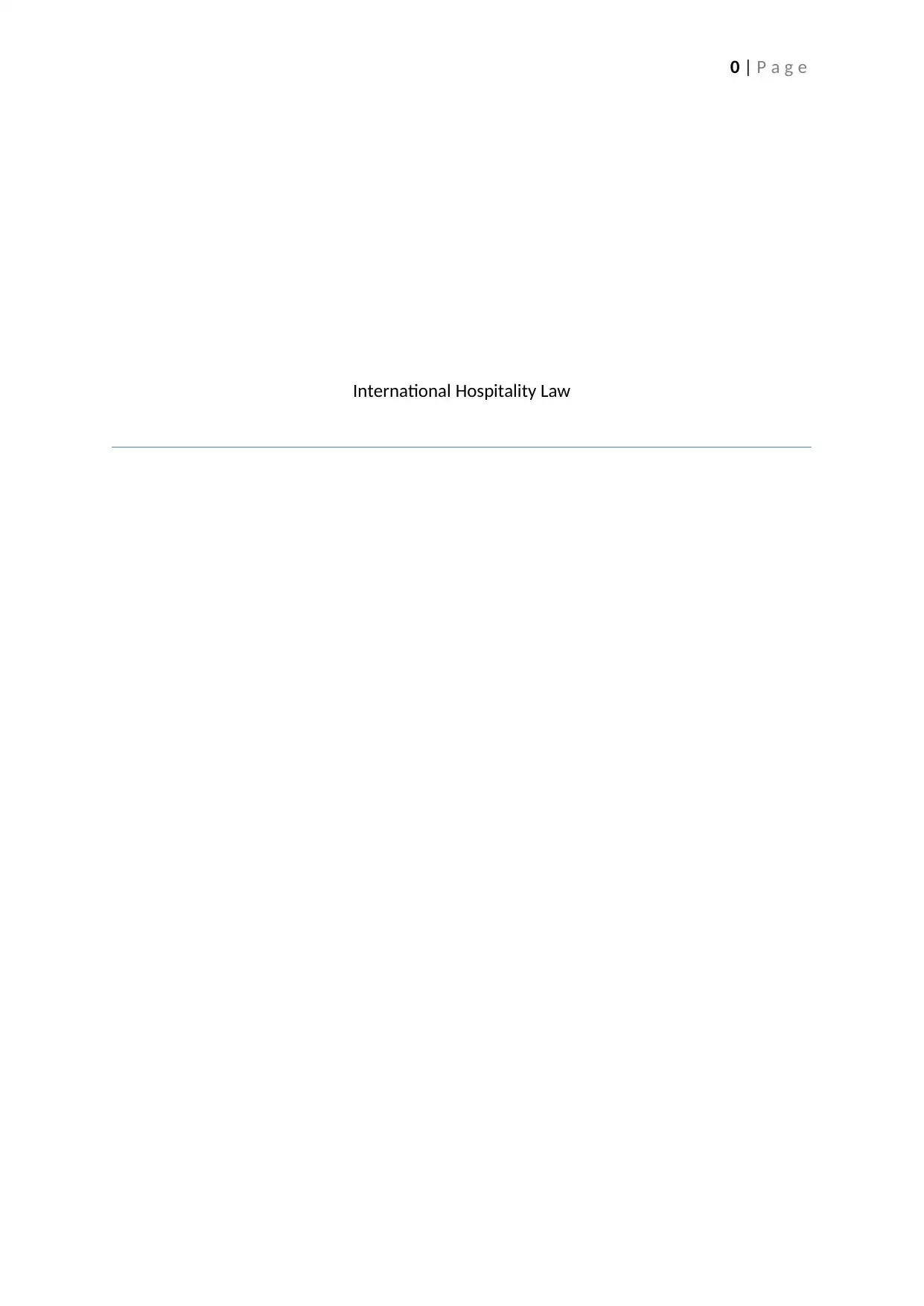
0 | P a g e
International Hospitality Law
International Hospitality Law
Paraphrase This Document
Need a fresh take? Get an instant paraphrase of this document with our AI Paraphraser
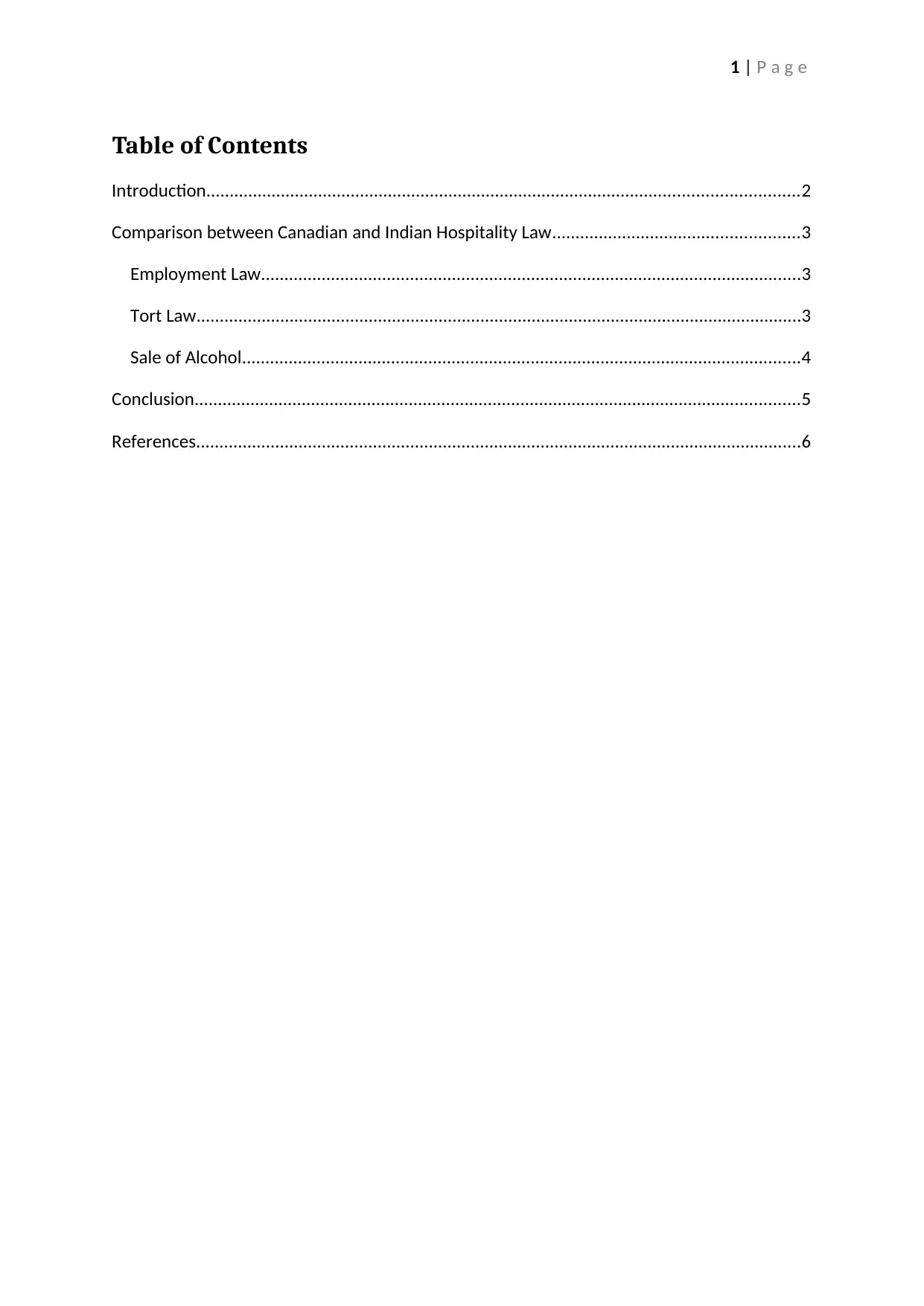
1 | P a g e
Table of Contents
Introduction...............................................................................................................................2
Comparison between Canadian and Indian Hospitality Law.....................................................3
Employment Law....................................................................................................................3
Tort Law..................................................................................................................................3
Sale of Alcohol........................................................................................................................4
Conclusion..................................................................................................................................5
References..................................................................................................................................6
Table of Contents
Introduction...............................................................................................................................2
Comparison between Canadian and Indian Hospitality Law.....................................................3
Employment Law....................................................................................................................3
Tort Law..................................................................................................................................3
Sale of Alcohol........................................................................................................................4
Conclusion..................................................................................................................................5
References..................................................................................................................................6
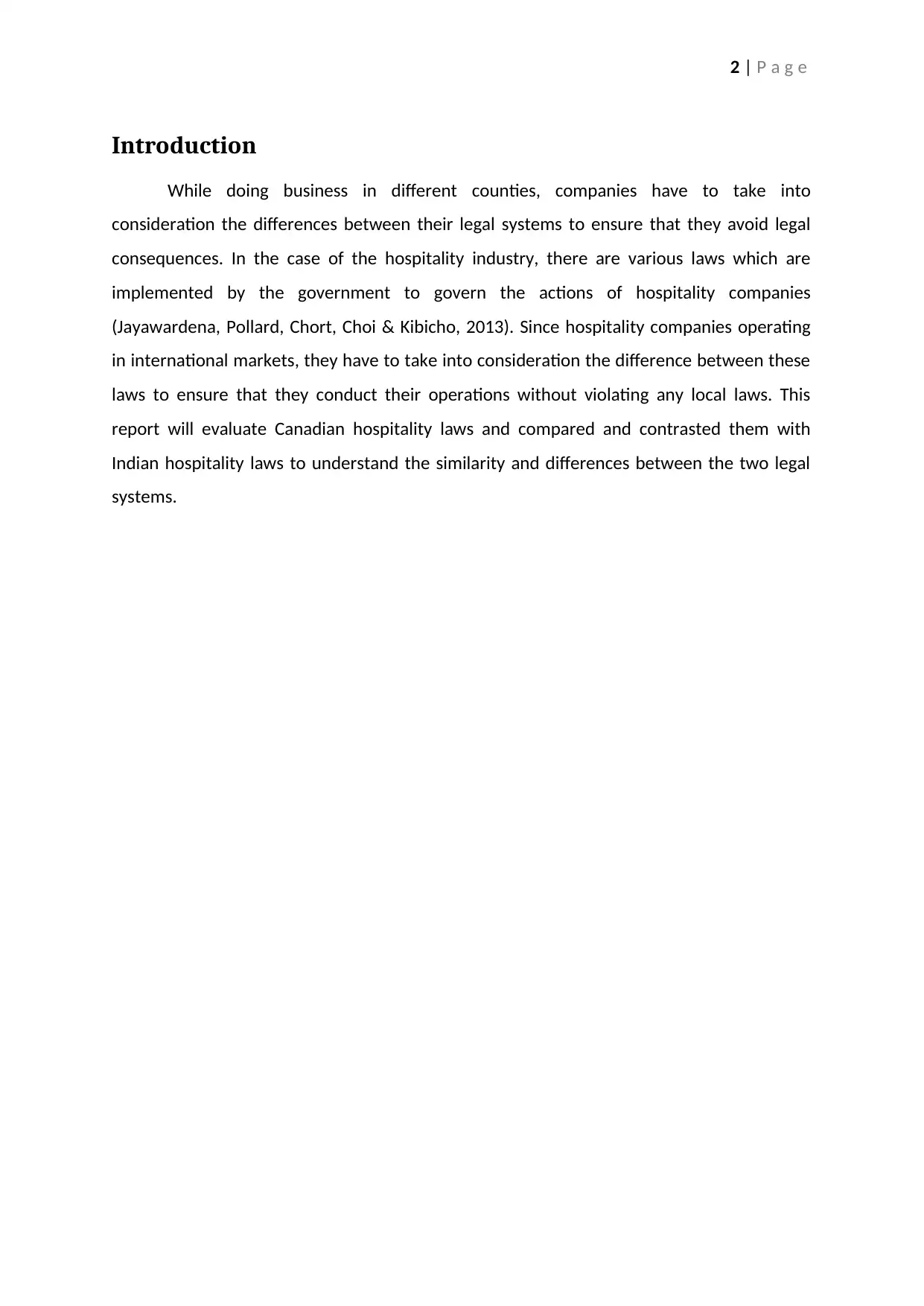
2 | P a g e
Introduction
While doing business in different counties, companies have to take into
consideration the differences between their legal systems to ensure that they avoid legal
consequences. In the case of the hospitality industry, there are various laws which are
implemented by the government to govern the actions of hospitality companies
(Jayawardena, Pollard, Chort, Choi & Kibicho, 2013). Since hospitality companies operating
in international markets, they have to take into consideration the difference between these
laws to ensure that they conduct their operations without violating any local laws. This
report will evaluate Canadian hospitality laws and compared and contrasted them with
Indian hospitality laws to understand the similarity and differences between the two legal
systems.
Introduction
While doing business in different counties, companies have to take into
consideration the differences between their legal systems to ensure that they avoid legal
consequences. In the case of the hospitality industry, there are various laws which are
implemented by the government to govern the actions of hospitality companies
(Jayawardena, Pollard, Chort, Choi & Kibicho, 2013). Since hospitality companies operating
in international markets, they have to take into consideration the difference between these
laws to ensure that they conduct their operations without violating any local laws. This
report will evaluate Canadian hospitality laws and compared and contrasted them with
Indian hospitality laws to understand the similarity and differences between the two legal
systems.
⊘ This is a preview!⊘
Do you want full access?
Subscribe today to unlock all pages.

Trusted by 1+ million students worldwide
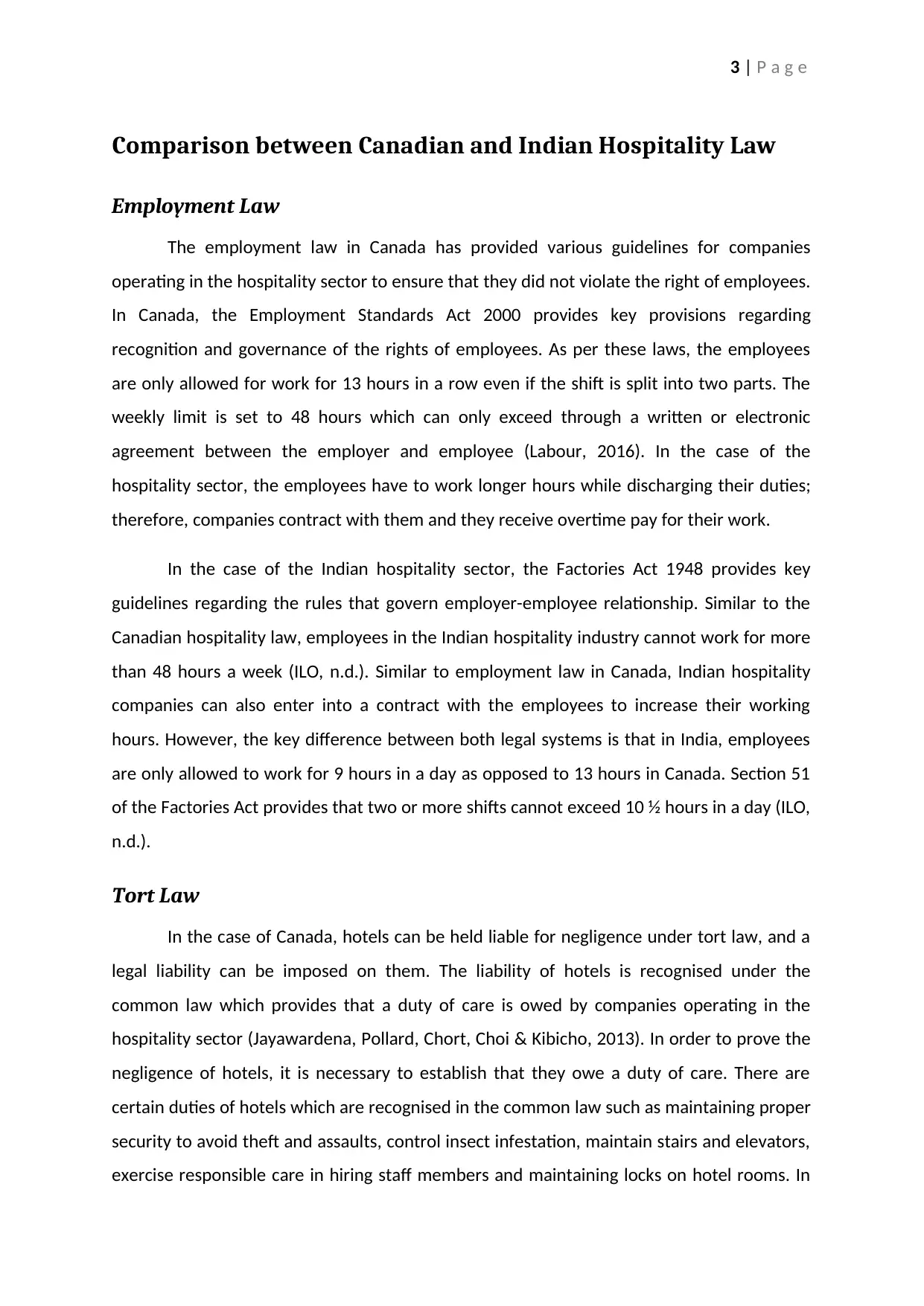
3 | P a g e
Comparison between Canadian and Indian Hospitality Law
Employment Law
The employment law in Canada has provided various guidelines for companies
operating in the hospitality sector to ensure that they did not violate the right of employees.
In Canada, the Employment Standards Act 2000 provides key provisions regarding
recognition and governance of the rights of employees. As per these laws, the employees
are only allowed for work for 13 hours in a row even if the shift is split into two parts. The
weekly limit is set to 48 hours which can only exceed through a written or electronic
agreement between the employer and employee (Labour, 2016). In the case of the
hospitality sector, the employees have to work longer hours while discharging their duties;
therefore, companies contract with them and they receive overtime pay for their work.
In the case of the Indian hospitality sector, the Factories Act 1948 provides key
guidelines regarding the rules that govern employer-employee relationship. Similar to the
Canadian hospitality law, employees in the Indian hospitality industry cannot work for more
than 48 hours a week (ILO, n.d.). Similar to employment law in Canada, Indian hospitality
companies can also enter into a contract with the employees to increase their working
hours. However, the key difference between both legal systems is that in India, employees
are only allowed to work for 9 hours in a day as opposed to 13 hours in Canada. Section 51
of the Factories Act provides that two or more shifts cannot exceed 10 ½ hours in a day (ILO,
n.d.).
Tort Law
In the case of Canada, hotels can be held liable for negligence under tort law, and a
legal liability can be imposed on them. The liability of hotels is recognised under the
common law which provides that a duty of care is owed by companies operating in the
hospitality sector (Jayawardena, Pollard, Chort, Choi & Kibicho, 2013). In order to prove the
negligence of hotels, it is necessary to establish that they owe a duty of care. There are
certain duties of hotels which are recognised in the common law such as maintaining proper
security to avoid theft and assaults, control insect infestation, maintain stairs and elevators,
exercise responsible care in hiring staff members and maintaining locks on hotel rooms. In
Comparison between Canadian and Indian Hospitality Law
Employment Law
The employment law in Canada has provided various guidelines for companies
operating in the hospitality sector to ensure that they did not violate the right of employees.
In Canada, the Employment Standards Act 2000 provides key provisions regarding
recognition and governance of the rights of employees. As per these laws, the employees
are only allowed for work for 13 hours in a row even if the shift is split into two parts. The
weekly limit is set to 48 hours which can only exceed through a written or electronic
agreement between the employer and employee (Labour, 2016). In the case of the
hospitality sector, the employees have to work longer hours while discharging their duties;
therefore, companies contract with them and they receive overtime pay for their work.
In the case of the Indian hospitality sector, the Factories Act 1948 provides key
guidelines regarding the rules that govern employer-employee relationship. Similar to the
Canadian hospitality law, employees in the Indian hospitality industry cannot work for more
than 48 hours a week (ILO, n.d.). Similar to employment law in Canada, Indian hospitality
companies can also enter into a contract with the employees to increase their working
hours. However, the key difference between both legal systems is that in India, employees
are only allowed to work for 9 hours in a day as opposed to 13 hours in Canada. Section 51
of the Factories Act provides that two or more shifts cannot exceed 10 ½ hours in a day (ILO,
n.d.).
Tort Law
In the case of Canada, hotels can be held liable for negligence under tort law, and a
legal liability can be imposed on them. The liability of hotels is recognised under the
common law which provides that a duty of care is owed by companies operating in the
hospitality sector (Jayawardena, Pollard, Chort, Choi & Kibicho, 2013). In order to prove the
negligence of hotels, it is necessary to establish that they owe a duty of care. There are
certain duties of hotels which are recognised in the common law such as maintaining proper
security to avoid theft and assaults, control insect infestation, maintain stairs and elevators,
exercise responsible care in hiring staff members and maintaining locks on hotel rooms. In
Paraphrase This Document
Need a fresh take? Get an instant paraphrase of this document with our AI Paraphraser
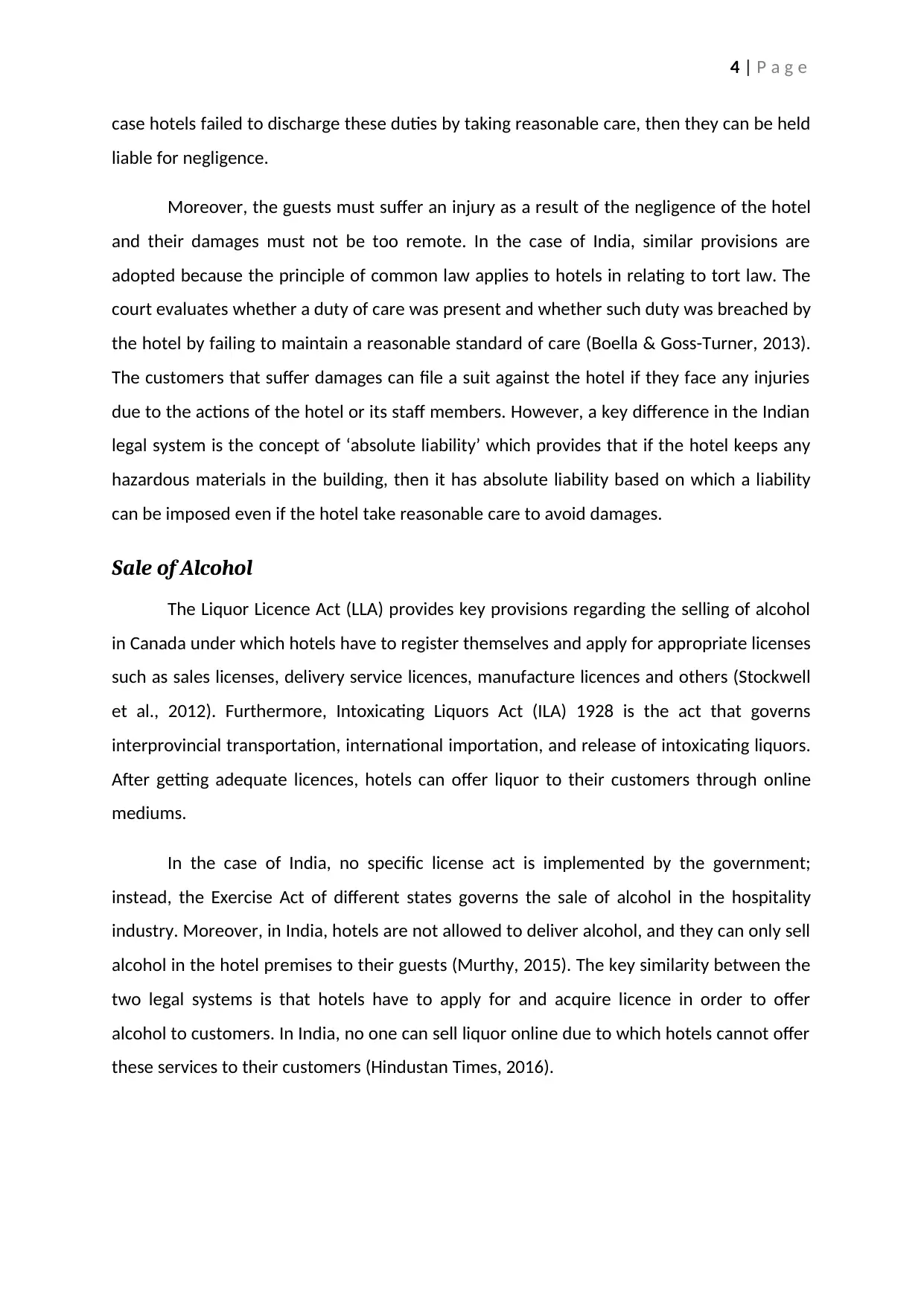
4 | P a g e
case hotels failed to discharge these duties by taking reasonable care, then they can be held
liable for negligence.
Moreover, the guests must suffer an injury as a result of the negligence of the hotel
and their damages must not be too remote. In the case of India, similar provisions are
adopted because the principle of common law applies to hotels in relating to tort law. The
court evaluates whether a duty of care was present and whether such duty was breached by
the hotel by failing to maintain a reasonable standard of care (Boella & Goss-Turner, 2013).
The customers that suffer damages can file a suit against the hotel if they face any injuries
due to the actions of the hotel or its staff members. However, a key difference in the Indian
legal system is the concept of ‘absolute liability’ which provides that if the hotel keeps any
hazardous materials in the building, then it has absolute liability based on which a liability
can be imposed even if the hotel take reasonable care to avoid damages.
Sale of Alcohol
The Liquor Licence Act (LLA) provides key provisions regarding the selling of alcohol
in Canada under which hotels have to register themselves and apply for appropriate licenses
such as sales licenses, delivery service licences, manufacture licences and others (Stockwell
et al., 2012). Furthermore, Intoxicating Liquors Act (ILA) 1928 is the act that governs
interprovincial transportation, international importation, and release of intoxicating liquors.
After getting adequate licences, hotels can offer liquor to their customers through online
mediums.
In the case of India, no specific license act is implemented by the government;
instead, the Exercise Act of different states governs the sale of alcohol in the hospitality
industry. Moreover, in India, hotels are not allowed to deliver alcohol, and they can only sell
alcohol in the hotel premises to their guests (Murthy, 2015). The key similarity between the
two legal systems is that hotels have to apply for and acquire licence in order to offer
alcohol to customers. In India, no one can sell liquor online due to which hotels cannot offer
these services to their customers (Hindustan Times, 2016).
case hotels failed to discharge these duties by taking reasonable care, then they can be held
liable for negligence.
Moreover, the guests must suffer an injury as a result of the negligence of the hotel
and their damages must not be too remote. In the case of India, similar provisions are
adopted because the principle of common law applies to hotels in relating to tort law. The
court evaluates whether a duty of care was present and whether such duty was breached by
the hotel by failing to maintain a reasonable standard of care (Boella & Goss-Turner, 2013).
The customers that suffer damages can file a suit against the hotel if they face any injuries
due to the actions of the hotel or its staff members. However, a key difference in the Indian
legal system is the concept of ‘absolute liability’ which provides that if the hotel keeps any
hazardous materials in the building, then it has absolute liability based on which a liability
can be imposed even if the hotel take reasonable care to avoid damages.
Sale of Alcohol
The Liquor Licence Act (LLA) provides key provisions regarding the selling of alcohol
in Canada under which hotels have to register themselves and apply for appropriate licenses
such as sales licenses, delivery service licences, manufacture licences and others (Stockwell
et al., 2012). Furthermore, Intoxicating Liquors Act (ILA) 1928 is the act that governs
interprovincial transportation, international importation, and release of intoxicating liquors.
After getting adequate licences, hotels can offer liquor to their customers through online
mediums.
In the case of India, no specific license act is implemented by the government;
instead, the Exercise Act of different states governs the sale of alcohol in the hospitality
industry. Moreover, in India, hotels are not allowed to deliver alcohol, and they can only sell
alcohol in the hotel premises to their guests (Murthy, 2015). The key similarity between the
two legal systems is that hotels have to apply for and acquire licence in order to offer
alcohol to customers. In India, no one can sell liquor online due to which hotels cannot offer
these services to their customers (Hindustan Times, 2016).
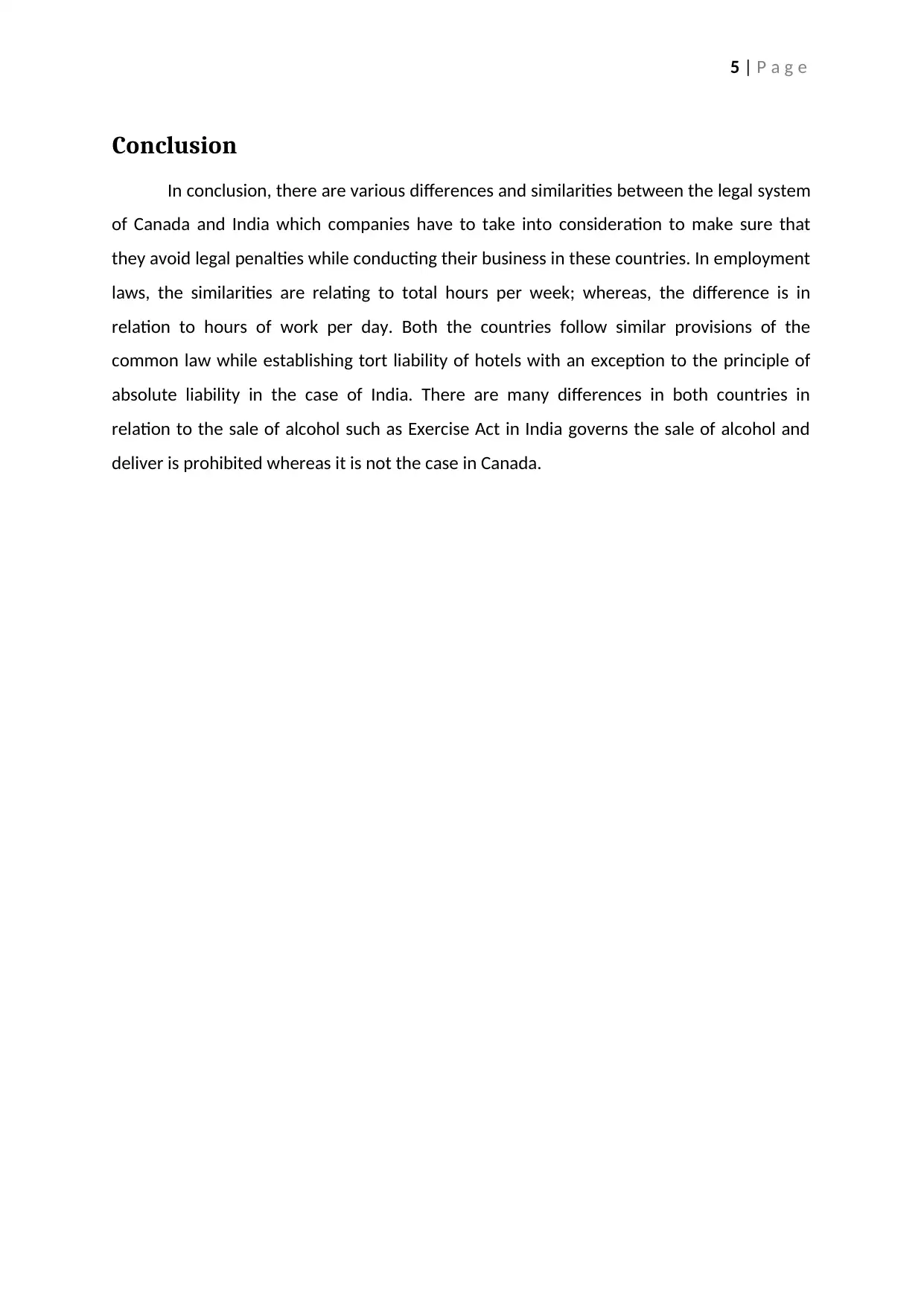
5 | P a g e
Conclusion
In conclusion, there are various differences and similarities between the legal system
of Canada and India which companies have to take into consideration to make sure that
they avoid legal penalties while conducting their business in these countries. In employment
laws, the similarities are relating to total hours per week; whereas, the difference is in
relation to hours of work per day. Both the countries follow similar provisions of the
common law while establishing tort liability of hotels with an exception to the principle of
absolute liability in the case of India. There are many differences in both countries in
relation to the sale of alcohol such as Exercise Act in India governs the sale of alcohol and
deliver is prohibited whereas it is not the case in Canada.
Conclusion
In conclusion, there are various differences and similarities between the legal system
of Canada and India which companies have to take into consideration to make sure that
they avoid legal penalties while conducting their business in these countries. In employment
laws, the similarities are relating to total hours per week; whereas, the difference is in
relation to hours of work per day. Both the countries follow similar provisions of the
common law while establishing tort liability of hotels with an exception to the principle of
absolute liability in the case of India. There are many differences in both countries in
relation to the sale of alcohol such as Exercise Act in India governs the sale of alcohol and
deliver is prohibited whereas it is not the case in Canada.
⊘ This is a preview!⊘
Do you want full access?
Subscribe today to unlock all pages.

Trusted by 1+ million students worldwide
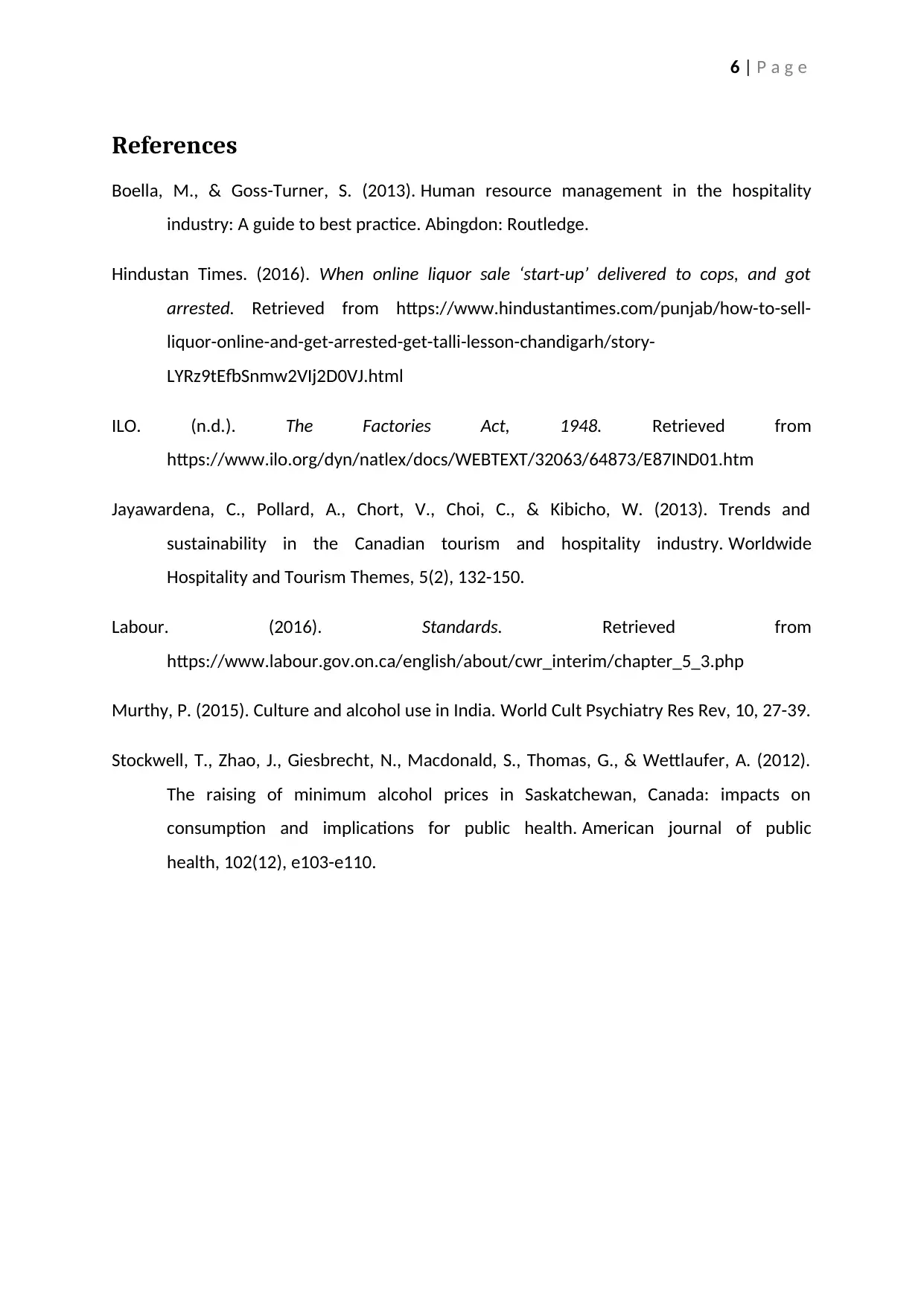
6 | P a g e
References
Boella, M., & Goss-Turner, S. (2013). Human resource management in the hospitality
industry: A guide to best practice. Abingdon: Routledge.
Hindustan Times. (2016). When online liquor sale ‘start-up’ delivered to cops, and got
arrested. Retrieved from https://www.hindustantimes.com/punjab/how-to-sell-
liquor-online-and-get-arrested-get-talli-lesson-chandigarh/story-
LYRz9tEfbSnmw2VIj2D0VJ.html
ILO. (n.d.). The Factories Act, 1948. Retrieved from
https://www.ilo.org/dyn/natlex/docs/WEBTEXT/32063/64873/E87IND01.htm
Jayawardena, C., Pollard, A., Chort, V., Choi, C., & Kibicho, W. (2013). Trends and
sustainability in the Canadian tourism and hospitality industry. Worldwide
Hospitality and Tourism Themes, 5(2), 132-150.
Labour. (2016). Standards. Retrieved from
https://www.labour.gov.on.ca/english/about/cwr_interim/chapter_5_3.php
Murthy, P. (2015). Culture and alcohol use in India. World Cult Psychiatry Res Rev, 10, 27-39.
Stockwell, T., Zhao, J., Giesbrecht, N., Macdonald, S., Thomas, G., & Wettlaufer, A. (2012).
The raising of minimum alcohol prices in Saskatchewan, Canada: impacts on
consumption and implications for public health. American journal of public
health, 102(12), e103-e110.
References
Boella, M., & Goss-Turner, S. (2013). Human resource management in the hospitality
industry: A guide to best practice. Abingdon: Routledge.
Hindustan Times. (2016). When online liquor sale ‘start-up’ delivered to cops, and got
arrested. Retrieved from https://www.hindustantimes.com/punjab/how-to-sell-
liquor-online-and-get-arrested-get-talli-lesson-chandigarh/story-
LYRz9tEfbSnmw2VIj2D0VJ.html
ILO. (n.d.). The Factories Act, 1948. Retrieved from
https://www.ilo.org/dyn/natlex/docs/WEBTEXT/32063/64873/E87IND01.htm
Jayawardena, C., Pollard, A., Chort, V., Choi, C., & Kibicho, W. (2013). Trends and
sustainability in the Canadian tourism and hospitality industry. Worldwide
Hospitality and Tourism Themes, 5(2), 132-150.
Labour. (2016). Standards. Retrieved from
https://www.labour.gov.on.ca/english/about/cwr_interim/chapter_5_3.php
Murthy, P. (2015). Culture and alcohol use in India. World Cult Psychiatry Res Rev, 10, 27-39.
Stockwell, T., Zhao, J., Giesbrecht, N., Macdonald, S., Thomas, G., & Wettlaufer, A. (2012).
The raising of minimum alcohol prices in Saskatchewan, Canada: impacts on
consumption and implications for public health. American journal of public
health, 102(12), e103-e110.
1 out of 7
Your All-in-One AI-Powered Toolkit for Academic Success.
+13062052269
info@desklib.com
Available 24*7 on WhatsApp / Email
![[object Object]](/_next/static/media/star-bottom.7253800d.svg)
Unlock your academic potential
Copyright © 2020–2026 A2Z Services. All Rights Reserved. Developed and managed by ZUCOL.
